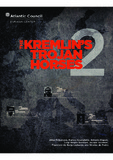| dc.contributor.author | Kounalakis, Markos | |
| dc.contributor.author | Klapsis, Antonis | |
| dc.date.accessioned | 2018-06-28T06:57:33Z | |
| dc.date.available | 2018-06-28T06:57:33Z | |
| dc.date.issued | 2017 | |
| dc.identifier.isbn | 978-1-61977-399-8 | |
| dc.identifier.uri | http://hdl.handle.net/11728/10967 | |
| dc.description.abstract | Russia has always had a strong—and sometimes
reciprocated—interest in Greece. From the birth
of modern Greece during its 1821 revolution
against Ottoman Turkey to its contemporary relations
with Greece’s ruling leftist Syriza party and through
their mutual support of Orthodox Christian institutions,
Russia has found Greece open to a strategic
relationship rooted in historic, cultural, and religious
connections. | en_UK |
| dc.language.iso | en | en_UK |
| dc.publisher | Atlantic Council. Eurasian Center | en_UK |
| dc.rights.uri | http://creativecommons.org/licenses/by-nc-nd/4.0/ | en_UK |
| dc.subject | Geopolitics | en_UK |
| dc.subject | Geostrategy | en_UK |
| dc.subject | Political influence | en_UK |
| dc.subject | International Relations | en_UK |
| dc.subject | State affairs | en_UK |
| dc.subject | European Union | en_UK |
| dc.subject | Russia | en_UK |
| dc.subject | Greece | en_UK |
| dc.subject | Italy | en_UK |
| dc.subject | Spain | en_UK |
| dc.subject | Nato | en_UK |
| dc.title | Greece still the EU's weak link? | en_UK |
| dc.title.alternative | The Kremlin's trojan horses: Russian influence in Greece, Italy and Spain | en_UK |
| dc.type | article | en_UK |


